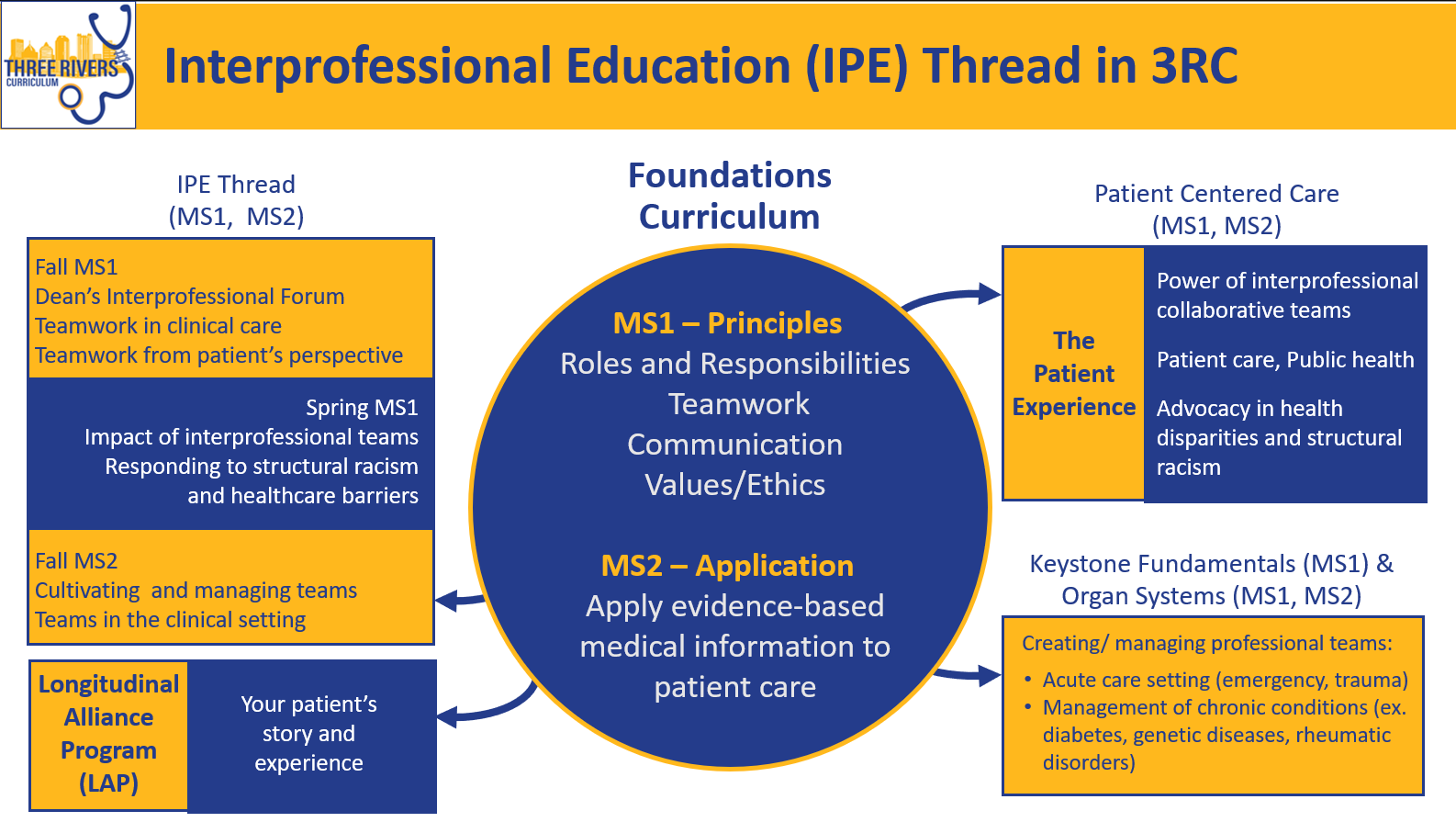Lead
Joe Suyama, MD, FACEP
Professor of Emergency Medicine
Department of Emergency Medicine
suyajx@upmc.edu
Lead
Greg Castelli, PharmD
Associate Professor
Department of Family Medicine
castellig@upmc.edu
Overview
Interprofessional Education (IPE) is a foundational principle and cornerstone of the Three Rivers Curriculum of the University of Pittsburgh School of Medicine (UPSOM). Because it is essential to the learning and the practice of Medicine, IPE is present longitudinally throughout the entire curriculum. IPE experiences are level appropriate, allowing for graduated learning, integration, and practice. Students are continuously exposed to non-physician professionals as educators, complementary to their base physician educators. Furthermore, students are immersed in appropriate co-learning opportunities with other professional students who originate from the six schools of the Health Sciences and beyond. IPE is thus ubiquitous throughout the curriculum and experiences of the medical students at UPSOM. Collaboration with the Pitt Working Group on Interprofessional Education (WGOIPE) will serve as an important sounding board for the IPE Thread.

Course Objectives
- Demonstrate knowledge of the roles and responsibilities of physicians and non-physician health care professionals.
- Utilize responsive, respectful, and thoughtful communication with non-physician health care professionals.
- Demonstrate working in teams with non-physician health care professionals in patient care.
- Recognize hurdles, work, and emotional toll of the caregiver and communicate clearly and empathetically.
- Outline how a healthcare team helps navigate a patient/caregiver/support persons’ journey in the health care system.
Framework of IPE Thread
Exposure to IPE occurs at defined times in the curriculum and are level appropriate experiences. Evaluation of IPE is formative in nature and takes into account pre-clinical and clinical variations of the students' experiences. IPE will use team-based teaching methods tailored to specific skill acquisition, and IPE experiences will be evaluated routinely to ensure quality and appropriateness of the experiences.
Preclerkship IPE:
During Keystone Foundations, students will be exposed to other health care professionals and settings to allow for interprofessional learning. Through Wednesday workshops, students will be exposed to the fundamental principles associated with IPE, including Roles and Responsibilities, Teamwork, Communication, and Values/Ethics.
Clerkship IPE:
Each clerkship will identify and catalog their IPE experiences, and they will be mapped to UPSOM education objectives. During clerkships, med students will receive integrated IPE experiences within EACH clerkship.
IPE experiences in the clerkships will be coordinated to maximize direct experience such that students will be exposed to and work with as many other non-physician health care professionals as possible
Assessment of IPE:
Interprofessionalism is best assessed via observation and self assessment of experience. This can be done and tracked via multiple models including:
- Learning logs
- Small group discussions
- Checklists for clinical teams
Assessment for interprofessionalism will be level appropriate and continue through the students’ progression through the curriculum. Assessments for interprofessionalism will be cumulative and at defined time periods in the curriculum to account for variations in students’ experiences.
Students who complete more than the minimum requirements for IPE should be acknowledged for their efforts.
Specific IPE opportunities:
IPE Curricular events originating at Pitt Schools of Health Sciences outside UPSOM should be encouraged and incentivized.
University of Pittsburgh Vaccine and Wellness Hub as a site for IPE.
Experiences for senior medical students should focus on working collaboratively and/or leading health care teams when appropriate.
